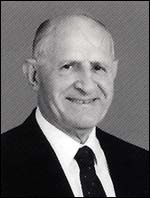Are you a journalist? Please sign up here for our press releases
Subscribe to our monthly newsletter:
Q: You arrived in Israel by a very circuitous route, didn't you?
Yehuda Assia: Yes, I guess you could say that. I was born in Baghdad, where my father was a textile importer. I worked with him until 1938, then decided to strike out on my own in the Far East. I first opened a trading company in Japan, then another trading business in Bangkok, where I lived during World War II. After the war, I moved to the United States. When the State of Israel was established in 1948, I decided the time had come to move here with my family.
Q: What did you do when you first came here?
Yehuda Assia: I had long thought of opening a bank, and in Israel I was able to realize my wish. We established the Geneva-based Swiss-Israel Trade Bank, through a 50-50 partnership between the Israeli government and a group I headed. During the 1950s and '60s, the bank was very involved in building Israel's economy. We lent hundreds of millions of dollars to some of the most important emerging enterprises and institutions -- among them the Citrus Marketing Board, Zim shipping lines, El Al, Mekorot [the water company -- Ed.], the Jewish Agency, Solel Boneh, the Defense Ministry and the Weizmann Institute, to name just a few. Later I became a partner in the Africa-Israel Corporation, and one of the founders of Clal [One of Israel's major holding companies -- Ed.].

Q: How did you become involved with the Weizmann Institute?
Yehuda Assia: In 1954, I was introduced to Meyer Weisgal [Chaim Weizmann's close associate and the driving force behind the Weizmann Institute's early development -- Ed.]. I liked him and I fell in love with the Weizmann Institute. Ever since, the Institute has been a hobby of mine. I have helped negotiate bank loans for it when necessary. I also helped mobilize the funds to publish 12,000 of Chaim Weizmann's letters and papers. They were collected in 23 volumes and published by Oxford University Press.
Q: We understand you helped prevent a brain drain in the late 1960s. What was your role?
Yehuda Assia: Yes, salaries were very low in the academic sector at the time. I told the Finance Minister, Pinhas Sapir, "We have to do something, or we will lose these scientists." In 1967, I headed a committee appointed to study the issue of salaries, housing, pensions and so on. We proposed a program of non-linked low-interest loans to help the professors purchase homes or make investments to supplement their income, and this proposal was approved by the Finance Minister and the tax authorities. These measures helped solve the problem.
Q: In all your public activities, education and culture seem to have been your overriding concerns.
Yehuda Assia: Yes, I'm very proud of the Iraqi Jews Scholarship Fund, which I co-founded in 1951. We have given some 18,000 scholarships over the years, and we provide after-school tutoring and have built six computer centers for youngsters in distressed neighborhoods. My proudest moments are when I see things develop. One day at one of the computer centers, I was watching a 10-year-old boy. You should have seen his face when he got the correct answer and the screen said "Yofi!" [beautiful! -- Ed.]. I asked him, "Are you happy?" and he said, "If not for you, we would have been on the streets." This is what gives me the greatest satisfaction. In this connection, I've long admired the Weizmann Institute for its leading role in raising the level of science education in Israel. I've always felt that since we have no raw materials in Israel, the only way to survive is through our brains.